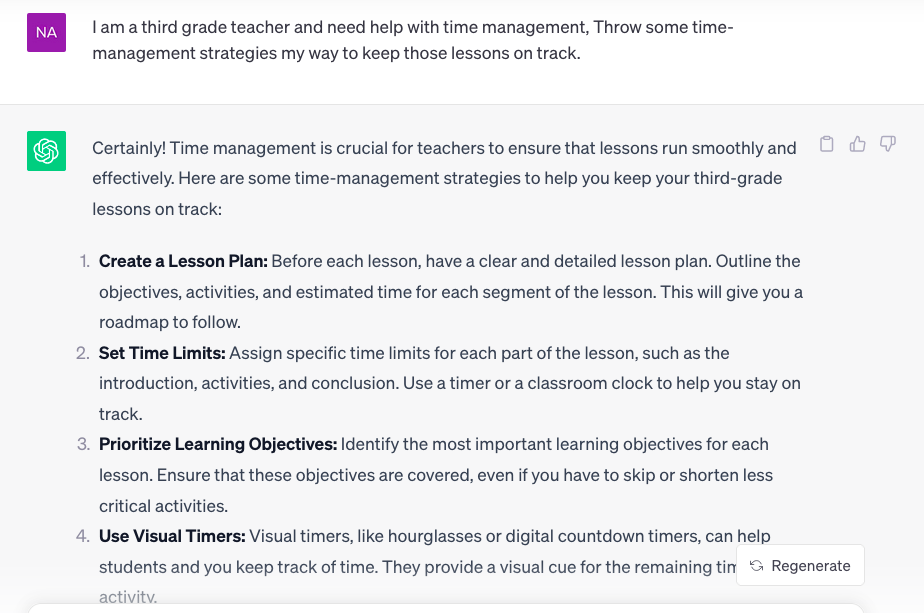For The First Time: ChatGPT in Your Teaching Arsenal
Teaching is a rewarding journey. Whether you're a seasoned educator with years of experience or just embarking on your path in the teaching profession, you're acutely aware that each day in the classroom presents a unique set of challenges and opportunities. I am going to make it a lot more interesting for you, because in this blog you are going to learn how to use ChatGPT in the classroom.
So let’s talk about ChatGPT, everyone is talking about it so lets get to it. This thing has seriously amped up my game. I remember back in the day when we didn’t have the internet. If you listened to Kurt Cobain or Sound Garden - you are in my category. Remember when business didn’t need to have a website? Eventually, they came to realize that they couldn’t afford not to have a website. Personal websites changed the way we did business back in the 90s in the same way ChatGPT can teach the way you work. One might say that if you are a TPT seller like me, you currently create great products and sell them without Chat. We’ve been doing it, we know how to do it well. Here’s some objective reality - other teacher sellers are going to exploit ChatGPT. It may be the case you have to use it to compete.
Here is the facts. I decided to give ChatGPT a little test. I wanted to see what would happen if teacher authors used chat to create products or write informational text. I minored in philosophy, and remember fondly a class I took years ago called “Philosophy of Existentialism”. I wrote five papers about the existentialist philosophies of Albert Camus and Jean Paul Satre. So I asked Chat to write me an essay about existentialism from the perspective of Camus. If I would have graded the essay I would have giving it a C+. Chat simply did not capture the nature of what existentialist philosophy really is, about how we first exist and essence proceeds existence. The response felt accurate, but it missed inherent meaning. Its hard to put my finger on.
My advice is that one should refrain from using it to write informational text. ChatGPT is a plagiarism word mapping machine. ChatGPT will not think for you, it will not do something that only a sentient being can do. When it tries, often it is right, but something we feel about the human spirit is lost. In literature it’s called ‘voice’, perhaps it takes a person much wiser than myself to coin the right term. Don’t get me wrong, it is a great technology, and very useful in marketing. My advice - be careful using it to compose informational text. Make an extra effort at policing yourself, or create a check list for things we should and should not do with it. Hold these standards as ethical truths, and allow them to evolve in open. You have to really understand any informational content yourself, content that you could have written with ease without ChatGPT and carefully revise what Chat gives you.
Long story short, ChatGPT has been a game-changer, and if you're into teaching or just curious about the world, it's time you meet your new partner in crime in the education scene.
Here is a list of prompts you can use in the classroom, these are examples of whys you can use ChatGPT in ethical ways.,,,
Icebreakers and Introductions:
"Give me an icebreaker activity to kick off the first day of class."
"Suggest a question that'll help students break the ice and introduce themselves."
"What's a creative way to get those wheels turning and students talking on day one?"
Behavior and Discipline:
"Provide me with strategies to tackle disruptive behavior head-on in the classroom."
"Offer some pearls of wisdom on how to foster active listening during lessons."
"Any secret sauce for handling tardiness or those pesky late submissions?"
Time Management:
"Help me whip up a daily schedule template that'll keep my classroom shipshape."
"Throw some time-management strategies my way to keep those lessons on track."
"What's the magic spell for motivating students to meet deadlines and stay organized?"
Classroom Organization:
"Share your wisdom on arranging desks or seating for ultimate focus mode."
"Recommendations for keeping things shipshape and clutter-free in the classroom, please."
"What ingredients should go into my classroom rules poster for maximum impact?"
Communication with Parents:
"Lay it on me – tips for nailing that parent-teacher communication game."
"How can I keep parents in the loop about classroom happenings and student progress?"
"Help me draft a class newsletter that's both friendly and informative."
These prompts are like a treasure chest of wisdom designed to help teachers and TPT sellers to navigate the challenging seas of classroom management. They cover everything from creating a positive classroom environment to tackling discipline and keeping the parent-teacher ship sailing smoothly. They offer practical, actionable ideas that educators can implement in their teaching journey.
But, wait for it, there's one small caveat – let's chat about the one reason not to rely solely on ChatGPT. It's crucial to remember that while ChatGPT is a fantastic tool, it's not a replacement for the real human connections and experiences that make teaching so special. As I discussed above, please do not use it to write any complex informational text. It is best to write that yourself. If you make the mistake of using this technology to write your text for you, I promise that your audience will figure it out. So, keep ChatGPT as your trusty first mate, but don't forget to steer the ship with your unique touch and expertise. Happy teaching! ⚓🍎📚

